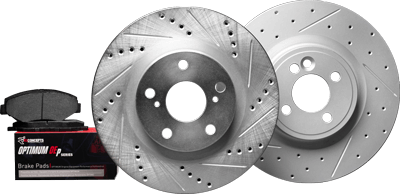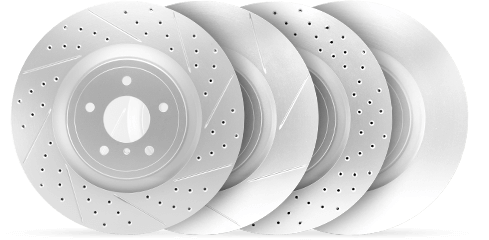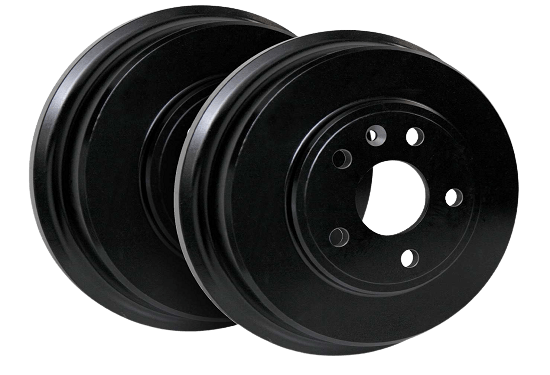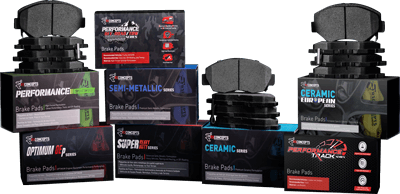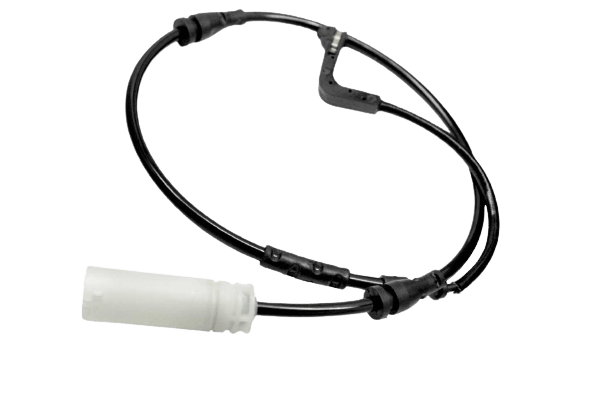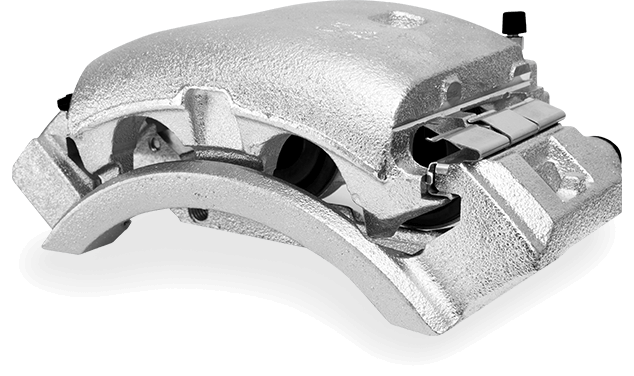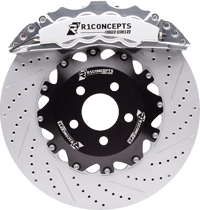Visit R1 Concepts to learn how to choose the right brake rotor pattern from drilled and slotted rotors to blank or slotted only, we’ll help you choose!

What Kind of Brake Rotors Are There?
Brake rotors come in many different types. Before you can purchase a fresh set of brake rotors, you must understand each of these different types, what sets them apart, and what are the pros and cons of every style. The four kinds of brake rotors are:
- Drilled Only – Drilled brake rotors are easy to recognize because they have a series of holes drilled into the metal.
- Slotted Only – Slotted rotors have slots, which look like lines in the metal.
- Drilled & Slotted – Drilled and slotted brake rotors combine the drill marking and slot marking.
- Blank or Smooth – As the name suggests, blank or smooth brake rotors have a smooth or plain surface, with no holes or markings in the metal.
Because the names of the different brake rotors styles accurately describe what each of the styles looks like, you can easily tell what kind of brake rotor you have on your car at even if you are new to auto maintenance and have never ordered brake parts before.
After you have reviewed the styles of brake rotors and can tell each of them apart, you must learn about the advantages and disadvantages of each style for the type of car you have. Since every car is different, what is fine for your light truck may not work very well for your sports car and vice versa.

Why Choose Drilled Rotors?
Best Brake Rotors for Street Performance
Pros:
If you live in an area that experiences a lot of rain, drilled rotors are a very good choice. They perform well in rainy climates by offering a good “wet bite,” hold up well over the life of the rotors, and deliver more friction and more bite than their slotted counterparts. The bite is better with these brake rotors because the drilled holes give the water a place to escape, thus drying off the braking system components when water is present. Less water means a better bite and improved brake rotor performance.
Cons:
While drilled rotors have a lot to recommend them, they can wear unevenly and may develop cracks when used in racing vehicles due to the heat and temperature extremes of a race. Drilled brake rotors also tend to wear in concentric grooved styles, which can look funny when the rotors are aged if the drilled hole patterns are not staggered. While this does not impact the performance of the brake rotors, it can affect the vehicle aesthetic and sensitive drivers may prefer to select a different style of brake rotor or else change out their rotors more often.
Drilled rotors are also a poor choice for race cars. They cannot withstand repeated heat and cool cycles very well, and will fail sooner rather than later as a result. Drilled brake rotors are fine for general use in street vehicles.
Shop R1 Concepts Drilled Rotors

Why Choose Slotted Rotors?
Best for Street Performance, Autocross/Track, Towing/Hauling, Off-Road
Pros:
Slotted rotors work very well for heavy trucks, SUVs, off road vehicles, tow trucks, and competition cars. It is particularly important to choose high quality brake rotors when picking a slotted style. If the brake rotors are not properly machined, from the inner to the outer edges, they can crack sooner than they otherwise would or should.
This style of brake rotor delivers improved consistency with every stop, by reducing the friction in the brake pads. Over the long run the slotted rotors also perform well: As the slots shave down glaze from overheated brake pads, they expose fresh material every time you brake. As a result, you can rely on these pads to deliver effective braking even in heavy duty vehicles.
Cons:
Slotted brake rotors are not without their disadvantages: They tend to have a shorter life compared with other types of brake rotors, and may shorten the life of brake pads as well. When you are coming to a stop from a high speed, you can feel a rumble from the rotors. They will still perform safely; you may just find the noise unpleasant.
Shop R1 Concepts Slotted Rotors

Why Choose Drilled & Slotted Rotors?
Best for Street Performance, Towing/Hauling, Off-Road
Pros:
Drilled & slotted brake rotors offer the benefits of drilled and slotted rotors together. Like drilled rotors, they work well for wet climates where frequent rain is a consideration.
They perform well, although not necessarily better than other styles of brake rotors. These newer brake rotors are starting to appear on some luxury cars, including Mercedes and BMW. Car owners looking to be consistent with maintenance may prefer to stick with the drilled & slotted brake rotors if these were original to their vehicle.
Drilled and slotted rotors do work particularly well for tow vehicles, trucks, and other cars that carry heavy loads. Heavier vehicles require more energy to come to a stop safely, and this type of brake rotor excels at delivering it. Drilled & slotted brake rotors are also are fine for general use in street vehicles.
Cons:
Drilled & slotted rotors are not recommended for performance racing since the drilling makes them vulnerable to cracking.
Shop R1 Concepts Drilled & Slotted Rotors
Why Choose Blank (OEM) Brake Rotors?
Best for Street, Autocross/Track, Towing/Hauling, Off-Road
Pros:
Far and away, most new cars come with blank rotors installed both for maximum effectiveness across driving conditions and for cost effectiveness. If you do not drive aggressively, have a luxury car, or seek a brake rotor that is quiet above all, smooth rotors can be the right choice for you.
A top choice for endurance racers who need a brake pad that can hold up through a long race, as well as an overall inexpensive brake rotor choice, smooth or blank brake rotors can work very well for many needs. They tend to be the longest lasting overall, while also produce very little dust and are quiet to operate. It is precisely the plain nature of these brake rotors that makes them last longer: Without any drill holes or slots there is little room for cracks to develop.
Cons:
There are not many cons to having a blank rotor. Some drivers have a misconception that they should choose slotted or drilled rotors over blank rotors for superior performance. This is not necessarily true, so do not feel the need to select a particular type of brake rotor over the misunderstanding that it is better than another style of brake rotor. It all depends on how you drive your vehicle and how you would like it to stop.
If you are happy with the type of brake rotor currently used in your car — which you should be able to view after removing the wheel — it may make sense to just replace the rotor with the same rotor. If you seek a rotor for a specific performance need, from rainy weather to race performance, then you now have the information that you need to be able to select in confidence the best brake rotors for your ride.
No matter the type of brake rotor you choose, pay attention to how your vehicle drives and how it brakes. As young brake system begins to age, plan ahead and order replacement parts so you can install new brake pads and rotors before your existing ones fail.
After you have decided which brake rotor to purchase, order the rotors of your choice from a reliable manufacturer. Install the new brake rotors yourself or schedule an appointment to have your certified mechanic do it for you. When combined with reliable brake pads, brake rotors will help you stay safe on the road.



